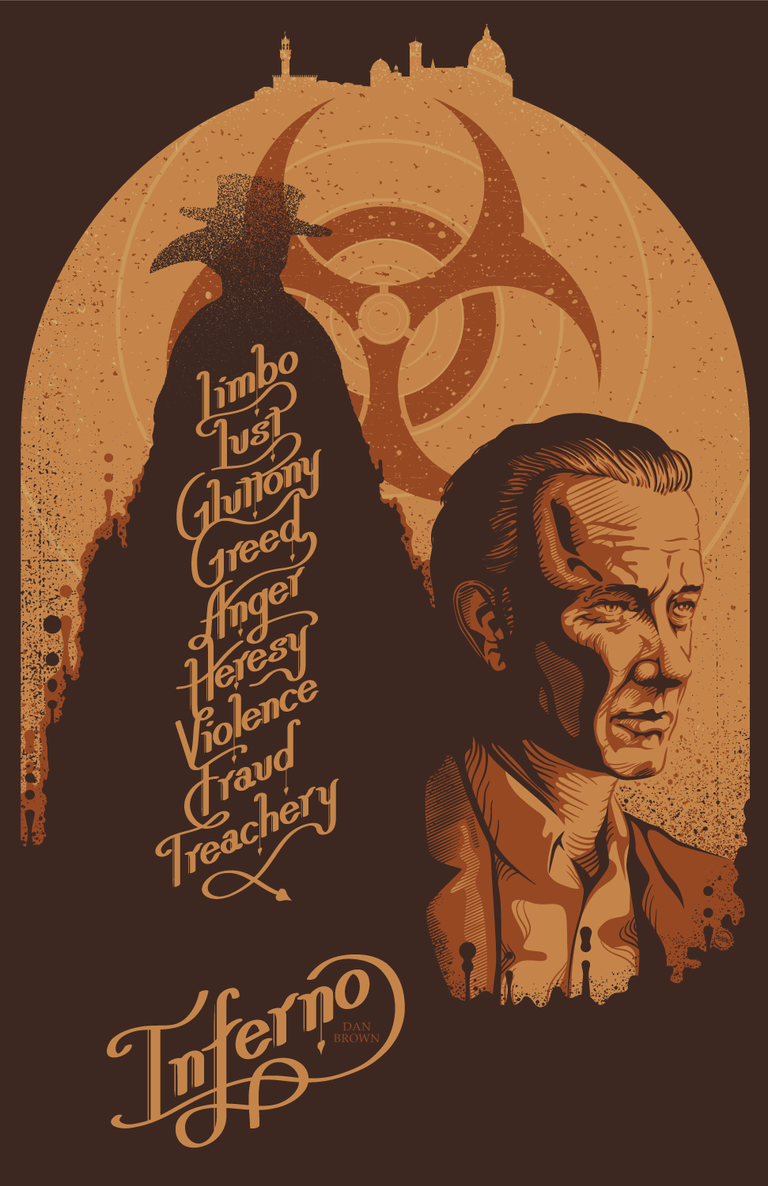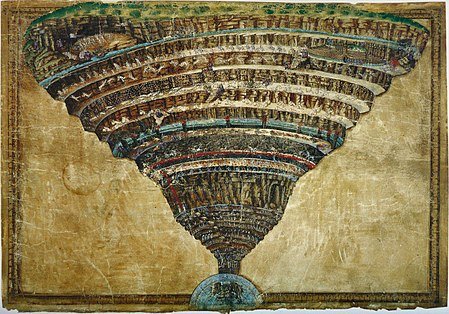Sigue bajando para la versión en español
Hey there, Hive!✨
Inferno ("Hell") is the fourth book in the saga written by Dan Brown where the he tells the stories of Robert Langdon, the symbolism professor who inevitably finds himself involved in the most incredible mysteries imaginable.
In this post I will share my opinion, which will have spoilers
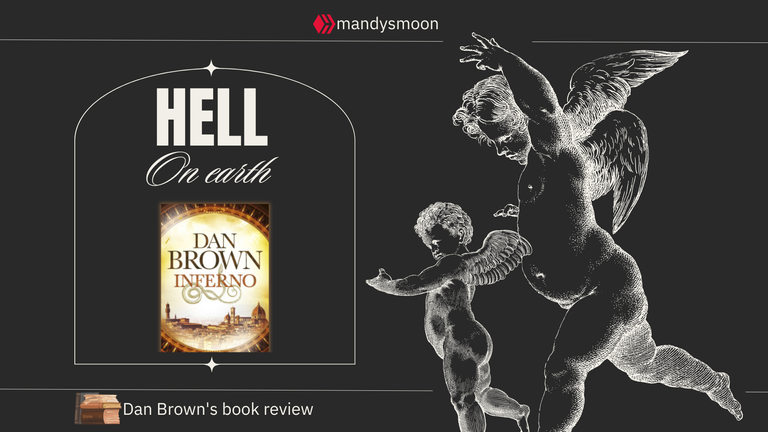

Synopsis
Novel published in 2013, the main allegory is to the work of Dante Alighieri, that poet who made a broad description of hell.
On this occasion the story begins with Robert barely regaining consciousness in a hospital. The last memory of him is at Harvard, the familiar university campus, but he is now in Florence and knows nothing else. Dr. Sienna Brooks explains that he suffered a concussion from a bullet. Langdon is stunned but is not given time to react as another woman suddenly appears and tries to kill him.
With the help of Dr. Sienna they manage to escape, but the surprises do not stop: Robert finds among his clothes a cylinder with a dangerous label that indicates biohazard. Alarmed, he contacts the United States Consulate and gives them his location. But just then the murderer appears again, from whom they barely manage to escape one more time. This event raises a question: Does the United States government intend to kill Robert?
Little by little Langdon will join the pieces of the puzzle, following the map of hell, to prevent it from breaking loose on earth.
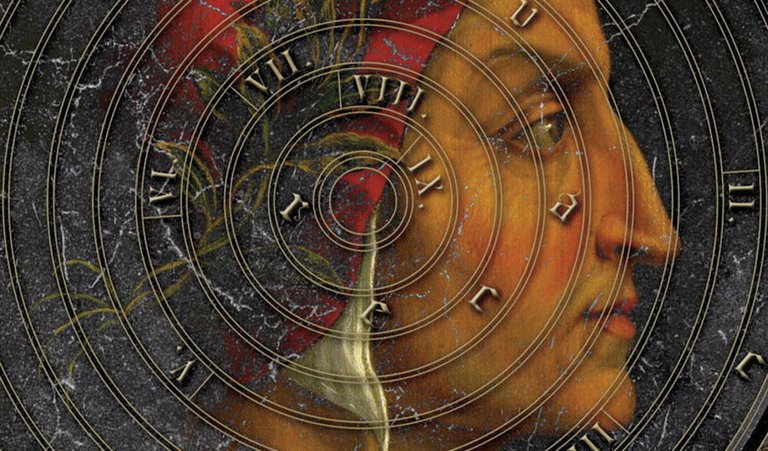

Personally, Dante's work is one of my favorites, in fact, a few months ago I talked about it in a post in this community. For the time, I consider that the imagination and creativity behind it is completely amazing and incredible; Its impact was so great that that hell that Dante narrated is the idea that comes to mind when you think about the subject. The circles of hell divided by the deadly sins, in a world consumed in disgrace and misery with Satan dwelling at the end... All of that was written by him.
So when I read the synopsis of this book I was quite excited because I knew that Dan Brown was going to get a lot out of it and he did. Inferno uses the imagery created by Dante to give a touch of mysticism to the mystery in which the protagonist is involved. For some reason there is a certain fear towards the idea of hell, so exploiting its potential in a suspense and thriller story is quite successful since it highlights it.
Of course Brown combines this with other works of art related to the theme, making a series of puzzles very well intertwined with each other that keep you hooked on reading because you need to know what is really happening, which on this occasion happens more than in the other books because that is shared with the protagonist, since he himself has too many doubts to begin with.
This is an entertaining and easy to read book, in fact one of the aspects that I liked the most is that for the first time in these stories the protagonist does not get his way. Robert fails to solve the mystery in time, which is a big change considering the outcome of the other books. This humanizes the character quite a bit, since it shows that things don't always go in his favor just as not everything seemed to magically make sense to him. He is a human being and as such, there are things that he simply did not realize. It is in this book where Brown finally lets go of the much-used resource of Deus ex machina.
He also proposes a rather interesting moral dilemma regarding human overpopulation, seeing it as a danger to the world as well as to the species itself. As a problem, it must be solved, and the villain comes up with a rather radical idea, however, he does not exterminate the race but rather sets out to regulate it. Of course the reflection in the book goes a little further, but if we consider the precarious state of the environment, the constant wars and conflicts, poverty and hunger... What would you do if you had the power to regulate all that?
This dilemma falls into somewhat moral gray areas, so reflecting on it is interesting.

However, I must admit that this is the book that I found the least exciting of the four (I still haven't read the last one), I think it is because the structure of Brown's books is always the same. That is, it begins with a mystery that for reasons that are never entirely clear involves Robert Langdon. He begins the investigation, always accompanied by a woman who is also involved in some way. Everything begins to get complicated and it becomes a race against time to save the world, which they achieve in three of the first four books.
The stories become dangerously repetitive and therefore predictable, so when reading Inferno there are many parts where you feel like you are reading the same thing as before. Obviously each author leaves a characteristic mark in each of his stories that makes the reader know that it is his work, but in this case it goes beyond that. I consider that Brown simply recycles the premise of the first book and adds details to make it something distinct.
I have to clarify that I don't dislike his novels at all; For a long time he was my favorite author. But it must be admitted that what hooks you into his stories is reading what historical or art data he used this time, but not the story per se since it is always the same. In the case of Inferno, it is still a very well-told story with very interesting facts to read in addition to the moral dilemma it poses, but I consider that it could have been formulated in a different way than the author's other three books.
But besides that, it is a 100% recommended book for fans of the thriller and science fiction genre. It is exciting and capable of entertaining you, keeping you glued to its pages until the end, which I consider to be the best part.
So you should go read this book series now if you haven't already. You won't regret it ✨
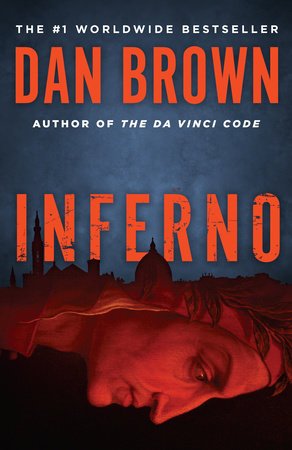




Español
¡Hola, Hive!✨
Inferno es el cuarto libro de la saga escrita por Dan Brown donde se narran las historias de Robert Langdon, el profesor se simbología que irremediablemente se ve involucrado en los misterios más increíbles que se puedan imaginar.
En este post les compartiré mi opinión, la cual tendrá spoilers
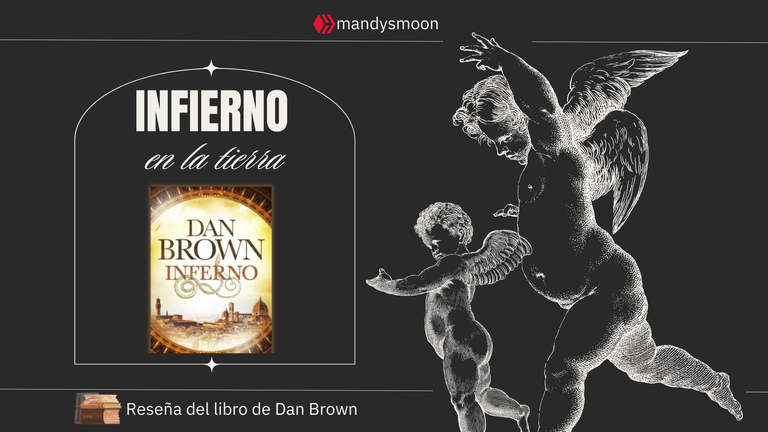

Sinopsis
Novela publicada en 2013, la alegoría principal es a la obra de Dante Alighieri, aquel poeta que hizo una amplia descripción del infierno.
En esta ocasión la historia inicia con Robert apenas recuperando la consciencia en un hospital. Su último recuerdo es en Harvard, el familiar campus universitario, pero ahora se encuentra en Florencia y no sabe nada más. La doctora Sienna Brooks le explica que sufrió una contusión cerebral debido al roce de una bala. Langdon está atónito pero no le dejan tiempo de reaccionar puesto que de repente aparece otra mujer que intenta asesinarlo.
Con ayuda de la doctora Sienna logran huir, pero las sorpresas no se detienen: Robert encuentra entre su ropa un cilindro con una peligrosa etiqueta que señala peligro biológico. Alarmado se pone en contacto con el Consulado de Estados Unidos y les da su ubicación. Pero justamente vuelve a aparecer la asesina de quien a duras penas logran huir nuevamente. Este suceso plantea una duda: ¿El gobierno de Estados Unidos pretende matar a Robert?
Poco a poco Langdon irá uniendo las partes del rompecabezas, siguiendo el mapa del infierno, para evitar que éste se desate en la tierra.


Personalmente la obra de Dante es una de mis favoritas, de hecho, hace unos meses hablé sobre ello en un post en esta comunidad. Para la época considero que la imaginación y creatividad que hay detrás es completamente alucinante e increíble; tanto fue su impacto que aquel infierno que narró Dante es la idea que se te viene a la cabeza cuando piensas en el tema. Los círculos del infierno divididos por los pecados capitales, en mundo consumido en desgracia y miseria con Satanás morando al final... Todo eso fue escrito por él.
Entonces cuando leí la sinopsis de éste libro me emocioné bastante porque sabía que Dan Brown le iba a sacar mucho provecho y así fue. Inferno utiliza el imaginario creado por Dante para darle un toque de misticismo al misterio en el que se ve envuelto el protagonista. Por alguna razón existe cierto temor hacia la idea del infierno, por lo que explotar su potencial en una historia de suspenso y thriller es bastante acertado puesto que lo resalta.
Por supuesto Brown combina ésto con otras obras de arte relacionadas a la temática, haciendo una serie de acertijos muy bien entrelazados entre sí que te mantienen enganchado a la lectura porque necesitas saber qué es lo que sucede realmente, cosa que en ésta oportunidad más que en los otros libros se comparte con el protagonista, puesto que él mismo tiene demasiadas dudas desde el inicio.
Éste es un libro entretenido y fácil de leer, de hecho uno de los aspectos que más me agradó es que por primera vez en éstas historias el protagonista no se sale con la suya. Robert no logra resolver el misterio a tiempo, lo que supone un gran cambio considerando el desenlace de los otros libros. Esto humaniza al personaje bastante, puesto que demuestra que las cosas no siempre salen a su favor así como no todo parecía tener sentido mágicamente para él. Es un ser humano y como tal, hay cosas de las que simplemente no se dió cuenta. Es en éste libro donde Brown por fin se desprende del muy utilizado recurso del Deus ex machina.
Aparte propone un dilema moral bastante interesante respecto a la sobrepoblación humana, viéndola como un peligro para el mundo así como para la propia especie. Como un problema, hay que resolverlo, y al villano se le ocurre una idea bastante radical, sin embargo, no extermina a la raza sino que se propone regularla. Por supuesto la reflexión en el libro va un poco más allá, pero si consideramos el precario estado del medio ambiente, las constantes guerras y conflictos, la pobreza y hambruna... ¿Qué harías tú si tuvieras el poder de regular todo eso?
Este dilema cae en áreas morales un tanto grises, por lo que reflexionar al respecto es interesante.

Sin embargo, debo admitir que este es el libro que me resultó menos emocionante de los cuatro (aún no leo el último), pues creo que se debe a que la estructura de los libros de Brown siempre es la misma. Es decir, comienza con un misterio que por razones que nunca quedan claras del todo involucra a Robert Langdon. Éste comienza sus investigaciones siempre acompañado de alguna mujer que también queda involucrada de alguna forma. Todo comienza a complicarse y se vuelve una carrera contra el tiempo para salvar al mundo, lo cual logran en tres de los primeros cuatro libros.
Las historias se vuelven peligrosamente repetitivas y por tanto predecibles, así que al leer Inferno hay muchísimas partes donde sientes que estás leyendo lo mismo de antes. Obviamente cada autor deja una huella característica en cada una de sus historias que hace al lector saber que es una obra suya, pero en este caso más allá de eso, considero que Brown simplemente recicla la premisa del primer libro y le agrega detalles para hacerlo algo distinto.
He de aclarar que no me disgustan sus novelas en lo absoluto; durante mucho tiempo fue mi autor favorito. Pero debe admitirse que lo que te engancha a sus historias es leer cuáles datos históricos o del arte habrá utilizado esta vez, pero no la historia per se puesto que es siempre la misma. En el caso de Inferno, sigue siendo una historia muy bien contada con datos muy interesantes de leer además del dilema moral que plantea, pero considero que pudo haber sido formulada de una manera diferente a las otras tres entregas del autor.
Incluso así, es un libro 100% recomendable para los fanáticos del género de thriller y ciencia ficción. Es emocionante y capaz de entretenerte, manteniéndote pegado a sus páginas hasta el final, es cual considero que es la mejor parte.
Así que deberías ir a leer ya ésta saga de libros si no lo has hecho ya. No te arrepentirás ✨





